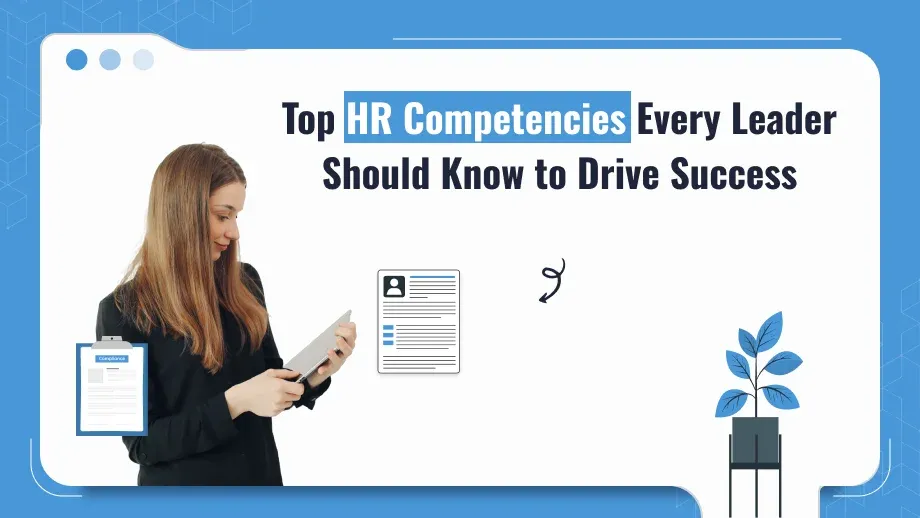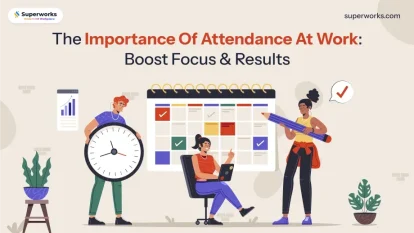
HR competencies are what knowledge, skills, and behaviors are needed for good human resource management. Developing foundational HR will cause leaders to better assist team success, employee effort to be more aligned with the goals of the company, and management of a productive work environment.
We will find in this guide the key HR competencies and the role of competency mapping in HR. Moreover, how competency-based HR management contributes to business success and what new emerging HR come along with digital transformation and industry changes. Any HR professional and leader must master these competencies for the sustainable growth of an organization.
Core HR Competencies Every Leader Should Know
Developing core HR competencies is essential for effective leadership and team management. Below are some of the key HR that leaders need to drive success.
Strategic Thinking:
It enables leaders to be proactive in their decisions by keeping the HR functions of the organization in line with the organizational goals. The leader, being well-equipped with HR, evaluates the long-term implications of his or her decisions along with the foreseen problems, thus ensuring all the teams are working on the right path toward the direction of the company.
Communication:
Effective communication lies at the heart of HR and leadership. Clear communication helps leaders open channels for discussion and solving conflicts. It creates a culture where team members are valued and heard. The emphasis is on clear, empathetic communication that builds trust, which remains an essential anchor to ensure the engagement of employees.
The ethical practitioner:
Provides leaders with a foundation for establishing just and respectful work environments. The competency of HR transparency, integrity, and accountability; ethical practice fosters an inclusive workplace, reduces workplace conflict, and lays down the foundations for long-lasting loyalty and trust in the team.
Talent Management:
Talent management would be successful in the case of recruitment, development, and retention of skilled employees. Good leaders in the area of talent management develop structured onboarding processes, continuous learning, and strategies that help keep them building a motivated and capable workforce.
HR Analytics:
One finds that analytics is a very critical competency, and when the focus gets data-driven in HR, one quickly finds this to be quite true. The intuitive decisions will have a better chance of being implemented by leaders who understand HR analytics, based on insights derived from data and improved employee satisfaction levels. For ideas on HR analytics projects that can help you build your skill set, read our guide on HR Analytics Projects.
These are the core HR competencies preparing leaders for the effective handling of teams, workplace issues, and all interactions that could impact positively upon the culture of the organization, keeping in the context of the overall company objectives.
Competency Mapping in HR: Identify Key Skills and Build
Competency Mapping of HR:
Competency mapping means identifying competencies that will have to be acquired by various roles for the skill assessment of employees. This would help leaders prepare focused development plans so that teams may acquire all the skills required to meet the organizational objectives.
How Competency Mapping Works:
Competency mapping begins with competencies as those roles need them that define strategic thinking, people management, and data analytics. Then leaders assess the present team skills and create training plans to organize their development for offsetting skill gaps. Thus, competency mapping aligns the skills of its people with organizational requirements while offering clarity to the workforce in terms of their growth paths as well as how the efficient working of the team is assured.
An example of competencies of HR manager might be for an HR manager as including relation-building skills with employees, resolving conflicts, and analytics within HR. By focusing on competency mapping, leaders can recognize those areas that need development, assist in skill building, and ensure that team members are prepared to assume responsibility.
Competency mapping in HR allows for employee development, which would result in sustained learning and even progress within the team. It further enables minimum basic HR concepts, such as employees’ goals being aligned with organizational ones, supporting a well-rounded and productive workforce.
Competency-Based HR Management and Organizational Success
Competency-based human resource management is based on the identification, development, and retention of talents based on distinct skills and behaviors. This concept facilitates a systematic approach towards the talent management of the team and thereby results in excellence in their performance.
Benefits of Competency-Based HR Management:
- Alignment with Business Goals: Business Goal Alignment Competency-based human resource management reflects the idea that employees shall possess the relevant abilities required by a company in order to satisfy the business objectives. Leaders can define what skills each role requires, providing the expectation for employees and a direction for growth that aligns with company goals.
- Better Decisions: Competency-based management of the HR level informs more decisions on the part of leaders. It means better promotion decisions, more logical assignments to projects, and decisions on restructuring, which simply leads to a more flexible workforce.
- Improved Employee Engagement: Employees who can clearly understand what competencies they possess and see an opportunity to further develop may become more engaged and motivated. The perception of goal relevance may reduce turnover while having a great productivity potential.
Competency-based HR management expands the foundation of HRM competencies but provides a much more structured way of building employees. It can now lead to a supportive work environment in which leaders can grow and retain top talent.
Impact of HR Competencies on Business Performance
HR competencies have strong, significant impacts on overall business performance. Leaders who focus more on ethical practice, talent management, and HR analytics are more likely to witness enhanced productivity and employee satisfaction as well as organizational resilience.
HR competencies have been proven to lower turnover and increase employee engagement in organizations. Establishing a strong foundation in HR enables leaders to create an environment that values and supports employees. It is the basis from which quality talent will be preserved and loyalty, motivation, and workforce built.
Finally, competency-based HR management promotes a data-informed approach, as decisions are based on the metrics of employee performance and satisfaction. The leaders utilizing HR analytics will have better insights in making decisions, thus helping to bring together the goals of the business and the solutions used by the HR department. All this would ultimately benefit the workplace more productive and positive and serve as a foundation for long-term success.
Enhancing HR Competencies has boosted team performance by over 50%!
Discover how Superworks can transform your HR capabilities.
HR Competencies and Digital Transformation
Digital transformation is reshaping HR competencies, offering new tools and technologies that improve team management. The rise of digital HR, AI, and other innovative solutions has introduced new competencies essential for leaders in a digital-first workplace.
Key Digital Competencies in HR
- Data Analytics: Data analytics have now become a new normal for the HR leader. This aspect helps HR leaders understand the engagement of employees, the retention rate, and the need in the workforce. A proficient leader in data analytics can make effective decisions that benefit team performance and optimize the entire process of HR operations.
- Automation: Automation tools combine or standardize any repetitive activities, allowing HR leaders to focus on strategic aspects that include employee development. Automation of the functions in HR payroll processing and leave management streamlines it and saves time, labor, and stress, thus assisting the employees and HR leaders.
- Virtual Collaboration Tools: Today, virtual collaboration tools can be absolutely essential for building cohesion in a team. An HR leader who uses such technologies effectively can engage teams located across space and ensure smooth communication as well as collaboration to ensure the work is done on time.
- Tech-Enhanced Talent Management: Technology-driven talent management tool virtual onboarding and AI-based recruitment enable leaders to source and retain more talent. Provides insights on the skills and fit of the candidates toward the organization for more effective and precise hiring processes.
- Digital HR Metrics: Digital solutions like AI in HR Statistics will help in knowing whether digital changes bring improvements in the workforce or not. With such metrics, leaders can be more insightful about new technologies and modify strategies based on their effectiveness.
The grooming of leaders who are in turn responsible for embracing the changes through digital HR Portal transformation and developing appropriate digital competencies prepares them for a fast-paced world of today, highly driven by technology. A clear competency in digital competencies made leaders competitive, agile, and responsive to a modern workforce.
New Competencies in the Future of HR
HR competencies will be emergent and new and help leaders meet the demands of modern workers. Some of the critically important competencies gaining prominence in HR include:
Change management:
Guides the leader in taking teams through organizational change generally stemming from restructuring, introduction of new technologies, or changes in business strategies. This ensures that transitions occur peacefully, bringing minimal disruptions and allowing employees to keep their morale intact.
Innovation Management:
Innovation is also managed inside the HR practices, thus ensuring that there will be effective improvement in the performance of teams and problem-solving in a creative way. Innovational thinking leadership tends to be very responsive to the problems and changes at the workplace.
Cross-functional collaboration:
Cross-departmental collaboration is very essential in hybrid and remote work settings. Leaders who are masterful in cross-functional collaboration have much improved the communication process and thus ensure smoother processes. Consequently, problem-solving across teams is also enhanced.
Diversity and Inclusion (D&I) Initiatives:
The D&I initiative plays the role of doing far more than being ethical but rather providing a source of competitive advantage. Leaders with strong D&I competencies inspire an inclusive environment, where employees respect one another, and thus enhance morale and productivity.
Digital HR Skills:
As the integration of digital tools and AI solutions into human resources becomes more integral, leaders will need to adapt and catch up with the skills. Knowing digital HR in India tools from analytics platforms to collaboration software is crucial as it helps leaders navigate and capitalize on advancements in technology.
These new HR keep their leaders agile and responsive to the dynamics of the industry and the flow of events, helping them facilitate resilience in their teams. For more information on the newest waves in human resources, do check out our section on HR Innovation to see how innovation is shaping HR practices.
Conclusion
Developing HR competencies for strategic effectiveness is an important competence for a successful leader. Key skills like strategic thinking, communication, ethical practice, and talent management help leaders manage teams efficiently and align HR functions with business goals. HR software in India plays a pivotal role in enabling competency mapping and These two concepts of competency mapping in HR and competency-based HR management are essential frameworks for the identification and development of these skills to ensure that employees and leaders are well-positioned for success.
Digital transformation and the development of emerging competencies keep leaders flexible and future-driven. This would lead to a focus on HR competencies in building a work environment that fosters personal and organizational growth toward sustainable success. HRMS Payroll Software in India can support leaders in this endeavor by streamlining HR processes, enhancing workforce management, and fostering skill development. A leader who invests in these competencies builds hardy and productive teams better equipped for the demands of modern working.









